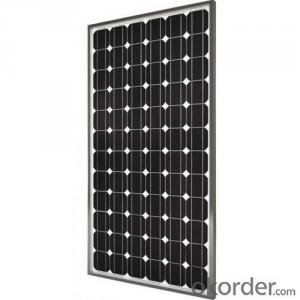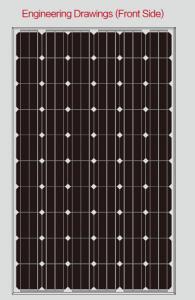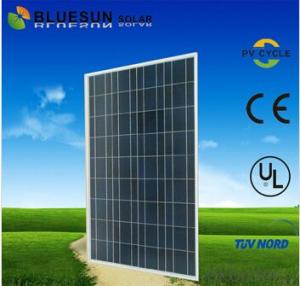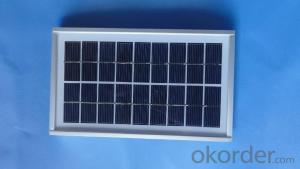Off-grid Solar Panel TDB125×125/5-36-P Reliable
- Loading Port:
- Ningbo
- Payment Terms:
- TT OR LC
- Min Order Qty:
- 100 carton
- Supply Capability:
- 10000 carton/month
OKorder Service Pledge
OKorder Financial Service
You Might Also Like
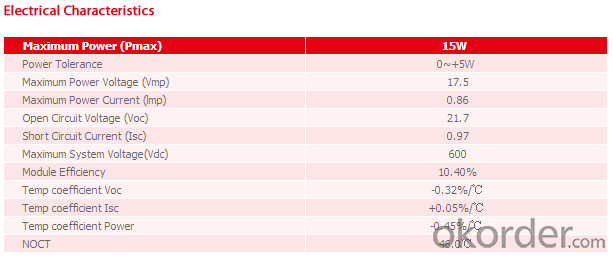
Specification:
· Highest performance enabled by higher efficiency monocrystal line cells and the latest Solar Wafer Technology for multicrystal line cells
· Lower weight design which reduces the total system load on a roof, making it ideal for residential customers. Its shape allows for better roof utilization
· Its low weight means easier handling for installers
· Modules are designed to withstand PID (Potential Induced Degradation)*
· High light transmission Anti-Reflective Glass with improved self-cleaning capability
· 0/+5 W Positive power tolerance for reliable power output
Warranty
CNBM Solar provides one of the most comprehensive module warranties in the industry:
· 10 years for product defects in materials and workmanship
· First 12 years for 90% of warranted minimum power
· Remaining 25 years for 80% of warranted minimum power
Certification
CNBM Solar strictly carries out the ISO 9001 quality control methodology and has implemented check points at every step of the production process to ensure our product performance durability and safety. The stringent quality control process has been confirmed by numerous independent agencies and LDK Solar modules earned IEC, TUV and UL certifications.
· IEC:IEC 61215, IEC 61730 (1&2), conformity to CE
· UL 1703 2002/03/15 Ed:3 Rev:2004/06/30
· ULC/ORD-C1703-01 Second Edition 2001/01/01
· UL and Canadian Standard for Safety Flat-Plate
· ISO 9001: 2008 Quality Management Systems
· CEC Listed: Modules are eligible for California Rebates
· PV Cycle: Voluntary module take back and recycling program
· MCS Certificate
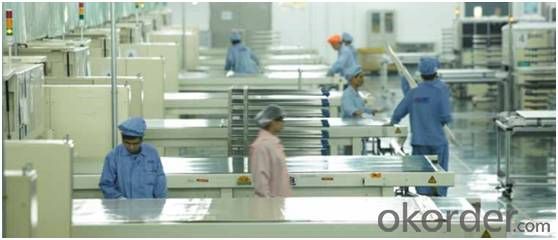
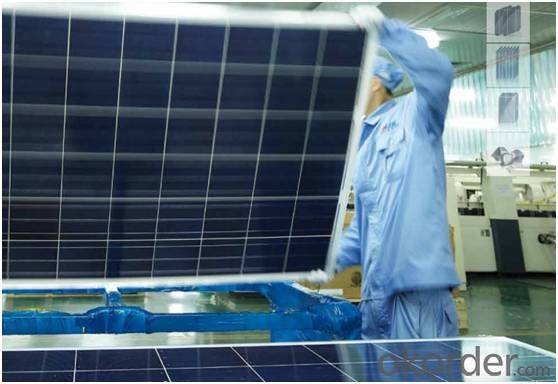
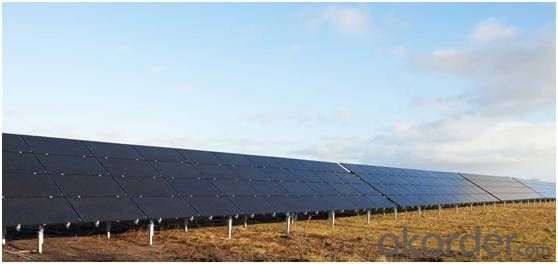
FAQ
1. How do I decide which system is right for me ?
For protection from long outages, include a generator or solar panels in your Must solar system. Shorter outages can be handled by a battery-only system.
2. Where my system will be installed ?
Must solar systems are usually wall-mounted near a home's main electrical (circuit breaker) panel.
3. How do I install my system ?
A must solar backup inverter is connected to a home electric system , we will supply detailed installation manual and videos for our customers .
How fast will my system respond to a power outage ?
Must solar inverters typically transfer to battery power in less than 16 milliseconds (less than 1/50th of a second).
What kind of batteries do the systems include ?
Must solar backup electric systems use special high-quality electric storage batteries.
- Q:How do solar panels affect satellite dish reception?
- Solar panels can potentially interfere with satellite dish reception if they obstruct the line of sight between the dish and the satellite. However, modern satellite technology and proper positioning of both the panels and the dish can often mitigate any negative impact on reception.
- Q:Can solar panels be used to power a military base?
- Yes, solar panels can be used to power a military base. Solar power is a clean and renewable energy source that can be harnessed to generate electricity for various purposes, including powering military installations. Implementing solar panels on military bases can help reduce reliance on traditional fossil fuels, increase energy independence, and contribute to a more sustainable and environmentally friendly operation of the base.
- Q:Do solar panels require a battery for storage?
- No, solar panels do not require a battery for storage.
- Q:So lets say that Everyday I use ,280 kWh. How many 250 watt solar panels would I buy so that I don't need to buy electricity anymore. Sorry if this sounds stupid, I am doing research on why american homes should become more cost efficient.
- Everyday I use ,280 kWh 280 kW-hour / 24 hours = 470 kW WOW, that is a very high power level, most homes use an average of .2 kW. My guess is that you mean you use 280 kW-hour in a year, which comes to an average power of .3 kW, typical. Assuming you get, worse case, 6 hours of sun per day, for the first case, 470 kW, each solar panel generates the equivalent of 250 x6/24 = 60 watts, so you would need 470k/60 = 8000 panels For the second case, .3 kw or 300 watts, divided by 60 that is about 20 panels. Depending on where you live, you could need as much as twice that number. Plus you need charge controller, lots of expensive batteries, and an inverter. The big problem is periods of no sun. If you demand continuous power, and you have a period of, say, 24 hours with no sun because of storms, etc, then the number of batteries increases to the hundreds.
- Q:what direction should solar panels face to get the best exposure of the sun.
- depends on the exposure.[trees other buildings, etc.] If you don't have trackers to keep the panels facing the sun , just plain old due south ,I've heard, is best for best average exposure.
- Q:I had installed over the summer a solar panel system on my house. Hers some infofor you: I live in MOThe system cost 25K (Rounded numbers)The Rebate from the utility company was about 0KThe expected tax rebate will be about 5KI have a home office from which I work and is 5% of my homes sq footage. My question is though I am getting a basic tax rebate, should I be able to claim part of this off as an expense for my home office?It seams logical since I used to deduct part of my electric bill and I there for should be able to write off part of this. I am, after all using electricity and getting a bill from the utility that is higher than it would be if I didn't have the office2. If so which amount should it be? The full 25K or something after the rebates.
- 5% of the Net Cost (After Rebates) Depreciated over 27.5 years. EDIT: Oops ....39 years. I was actually debated that in my head before I posted.
- Q:Do solar panels work in cloudy weather?
- Solar panels can still generate electricity in cloudy weather, though their efficiency may be reduced.
- Q:How could I find out what the amp output of a solar panel? Specifically, I want to know how many milliamps can the solar panel on a Casio fx-260 put out?
- You need full sunshine from the sun, or a lamp that will give a light spectrum similar to the sun, a volt meter, Milli-amp meter, and a variable resistor of 0 to 000 ohms. The voltmeter test leads go across the solar cell leads. The amp meter leads will be in series with the solar cell. Let's say, positive lead of the solar cell to the the positive lead of the amp meter, the negative lead of the amp meter to one terminal of the variable resistor, and the wiper terminal of the variable resistor to the negative lead of the solar cell. Slowly decrease the value of the resistor until the voltage from the solar cell just begins to drop. Take note of the amp meter reading. This is about the high end range of the solar cell. You might want to begin with a micro-amp meter for the current meter.
- Q:I am curious about how much of the energy that a solar panel of a given size and capacity will produce in it's lifetime, and what fraction of that energy was required to produce it in the first place?
- Best way to determine that is to find the retail cost of a solar panel and compare it to the retail cost of oil. Assuming similar profit margins a $300 solar panel costs the same to produce as 00 gallons of oil.
- Q:What is the lifespan of a solar panel?
- The average lifespan of a solar panel is around 25 to 30 years.
1. Manufacturer Overview |
|
|---|---|
| Location | |
| Year Established | |
| Annual Output Value | |
| Main Markets | |
| Company Certifications | |
2. Manufacturer Certificates |
|
|---|---|
| a) Certification Name | |
| Range | |
| Reference | |
| Validity Period | |
3. Manufacturer Capability |
|
|---|---|
| a)Trade Capacity | |
| Nearest Port | |
| Export Percentage | |
| No.of Employees in Trade Department | |
| Language Spoken: | |
| b)Factory Information | |
| Factory Size: | |
| No. of Production Lines | |
| Contract Manufacturing | |
| Product Price Range | |
Send your message to us
Off-grid Solar Panel TDB125×125/5-36-P Reliable
- Loading Port:
- Ningbo
- Payment Terms:
- TT OR LC
- Min Order Qty:
- 100 carton
- Supply Capability:
- 10000 carton/month
OKorder Service Pledge
OKorder Financial Service
Similar products
New products
Hot products
Hot Searches
Related keywords
